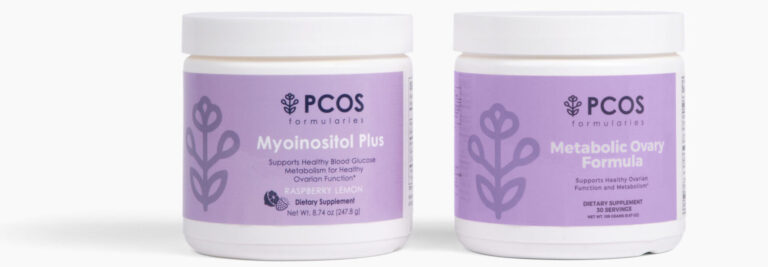at a glance
The Power of Exercise: How Physical Activity Can Help Manage PCOS Symptoms and Improve Health
Table of Contents
- 01 - Exercise Helps PCOS Patients Manage Weight
- 02 - Regulate PCOS Cycles with Exercise
- 03 - Exercise is a Powerful Tool to Improve Insulin Resistance in PCOS
- 04 - Reducing Inflammation in PCOS with Exercise
- 05 - Exercise Promotes Mental Health in PCOS
- 06 - Exercise Improves Fertility in PCOS Women
- 07- References
- 08 - DISCLAIMER
Polycystic ovary syndrome (PCOS) is a hormonal disorder that affects as many as 1 in 6 women. While we once thought of it as just a female hormone issue, it is much more than that. This is a syndrome that affects your metabolic health, fertility, mental health, and even your bone health!
Bet you haven’t heard much about PCOS and bone health yet, well that is a downstream affect of not ovulating and making progesterone.
While PCOS is characterized by hormonal imbalances, which can cause many symptoms like irregular menstrual cycles, weight gain, acne, and excess hair growth- there are long term impacts of this condition and the risk of developing diabetes, depression, female cancers and more.
As a woman who has this condition and a healthcare provider, I am a huge proponent of exercise as a treatment approach for PCOS symptom improvement and long-term management.
While PCOS may rear it’s ugly face in difficult times like infertility, it also impacts so much more and we need to start speaking about it in that way to drive home the importance of movement even if you don’t need to lose weight.
If you are wondering what the best exercise for PCOS is, check out the article answering that specific question here.
Here are some of the ways exercise and physical activity can help treat PCOS:
1. Exercise Helps PCOS Patients Manage Weight
Not all women with PCOS struggle with weight gain or difficulty losing weight as a symptom, but most of us do! I remember in my early twenties doing the same work my friends did, eating the same things and gaining weight while they lost weight. It is so damn discouraging!
The problem isn’t just that you gain weight easily and struggle to lose it, it’s that the extra adipose (yes, fat) tissue actually is an endocrine organ. It creates hormones. Guess which ones? Yep, your favorite ones!
Androgens (Male Hormones)
Fat cells don’t make androgens out of thin air, but they can convert precursors into androgens (male hormones, such as testosterone) through the action of the enzyme aromatase. In PCOS, this can contribute to the high androgen levels that lead to many of the condition’s symptoms, such as hirsutism (excessive hair growth), acne, and ovulatory dysfunction.
Inflammatory Cytokines
Fat tissue also secretes various inflammatory cytokines, such as tumor necrosis factor-alpha (TNF-α) and interleukin-6 (IL-6), which can contribute to the chronic low-grade inflammation observed in PCOS. This inflammation may further exacerbate insulin resistance and the development of metabolic syndrome in women with PCOS.
Weight gain is a common symptom of PCOS and can exacerbate other symptoms. Regular exercise can help manage weight and improve overall health. Additionally, exercise can help reduce abdominal fat, which is associated with an increased risk of developing type 2 diabetes and heart disease in women with PCOS.
Since adipose tissue can actually further contribute to PCOS symptoms, it’s really important to consider exercise as an avenue to improve percentage of body fat.
Now, I like you, have worked out before and not seen the scale move very quickly, but I did see my body change shape, clothes fit differently, muscle definition. So weight loss isn’t the only thing ladies!
A study published in the “Journal of the Endocrine Society” found that structured physical activity programs could significantly reduce weight and improve body composition in PCOS patients, thus alleviating symptoms related to weight gain.
Body composition changes can increase your metabolism and result in future weight loss, and the simple act of losing adipose tissue can actually improve hormones.

2. Regulate PCOS Cycles with Exercise
When I was in High School I enjoyed the fact that I didn’t get my period every month like some of my closest friends. However, I didn’t enjoy that so much when I became sexually active and never knew if I was pregnant or not.
I certainly didn’t enjoy it when I WANTED so badly to get pregnant and had no idea if or when I was ovulating.
Since I’ve been in this field for over 10 years now I know a regular menstrual cycle, and more precisely, regular ovulation is key in managing PCOS. Whether you want to get pregnant or not.
Exercise has been shown to improve hormone levels that impact cycle regularity. Part of this is accomplished by improving insulin sensitivity allowing the ovaries to stop making the gobs and gobs of testosterone they are making and instead shift to making estrogen.
If you are reading this and thinking, I want to be pregnant, like yesterday… girl I was you. Exercise can really help. Get busy, in more ways than one, and enjoy the sweat.
A study in “Fertility and Sterility” noted that women with PCOS who participated in regular exercise experienced more regular menstrual cycles compared to those who did not.

3. Exercise is a Powerful Tool to Improve Insulin Resistance in PCOS
Insulin resistance is a common issue faced by individuals with PCOS, leading to elevated insulin levels that can exacerbate hormonal imbalances. Exercise is a natural insulin sensitizer, which means it helps the body use insulin more effectively.
You’ve probably heard that doing resistance training is one of the best types of exercise for PCOS – it is GREAT, but getting in that cardio has it’s place too!
Aerobic exercises, in particular, have been shown to improve insulin sensitivity in women with PCOS, according to research in the “European Journal of Endocrinology.”
This improvement in insulin sensitivity can help in managing PCOS symptoms by reducing hyper-insulinemia and its impact on hormone levels.
When insulin levels come into a good balance this will naturally lower androgens and improve symptoms. It also has a downstream affect on inflammation and energy levels.
Exercise will literally help you have MORE energy! It will also help you sleep better at night and circadian rhythm is very intricately tied to hormone levels, so better sleep is better for your hormones, babe!
4. Reducing Inflammation in PCOS with Exercise
Chronic inflammation is another factor linked to PCOS. Exercise has anti-inflammatory effects that can benefit women with PCOS by reducing the levels of pro-inflammatory markers.
A systematic review and meta-analysis in the “Journal of Physiological Anthropology” found that regular exercise leads to a significant reduction in inflammatory markers in PCOS patients, contributing to the alleviation of symptoms and reducing the risk of developing related conditions such as cardiovascular disease.

5. Exercise Promotes Mental Health in PCOS
PCOS is associated with an increased risk of mental health issues, including depression, anxiety, and reduced quality of life. Engaging in regular exercise has been shown to improve mood, reduce stress levels, and enhance overall mental well-being.
The endorphins released during physical activity act as natural mood lifters, providing a sense of relief from the psychological burden of living with a chronic condition like PCOS.
The added benefits of increased energy can make managing other aspects of life and PCOS feel more manageable. Exercise doesn’t need to be something that you do to punish yourself for eating, in fact, if that is why you exercise, stop.
Exercise should be a way to enjoy your body, to move, to sweat, to dance. Find an avenue of exercise you enjoy that feels like you are pouring into yourself, not the other way around.
6. Exercise Improves Fertility in PCOS Women
For women with PCOS struggling with infertility, exercise can be a not just help you ovulate, it can help you manage the stress that often is associated with infertility.
Regular physical activity improves ovulatory function, increases the chances of spontaneous ovulation, and may enhance fertility outcomes. A study in the “International Journal of Obesity” highlighted the positive impact of weight loss achieved through exercise on ovulation and pregnancy rates in women with PCOS.

It’s just so supportive for your health. Building a rhythm and routine to make sure movement is incorporated into your day to day life is a great way to focus on helping your health goals and overall PCOS management.
References
DISCLAIMER
The advice provided in this article is for informational purposes only. It is not meant to augment and not replace consultation with a licensed health care provider. Consultation with a physician, dietitian, naturopathic doctor or other primary care provider is recommended for anyone suffering from a health problem.

I’M CAITLIN JOHNSON!
You are ready to trust your body again. You are ready to fix your hormones and fall in love with your body. Let me show you the way through comprehensive courses to manage your hormones and boost your fertility with PCOS.
Are you
struggling to get pregnant and you don’t know what step to take next. Join Find Fertility today and discover the process hundreds have used to get pregnant and have their dream baby.













